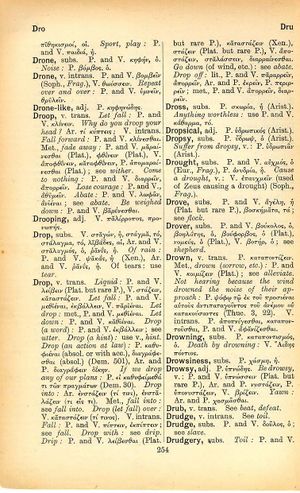drown: Difference between revisions
From LSJ
ἀλλ' ἐσθ' ὁ θάνατος λοῖσθος ἰατρός κακῶν → but death is the ultimate healer of ills
(Woodhouse 2) |
(CSV4) |
||
| Line 1: | Line 1: | ||
{{ | {{Woodhouse1 | ||
| | |Text=[[File:woodhouse_254.jpg|thumb|link={{filepath:woodhouse_254.jpg}}]]'''v. trans.''' | ||
P. καταποντίζειν. | |||
Met., <b class="b2">drown</b> (<b class="b2">sorrow, etc.</b>): P. and V. κοιμίζειν (Plat.); see [[alleviate]]. | |||
<b class="b2">Not hearing becausethe wind drowned the noise of their approach</b>: P. ψόφῳ τῷ ἐκ τοῦ προσιέναι αὐτοὺς ἀντιπαταγοῦντος τοῦ ἀνέμου οὐ κατακούσαντες (Thuc. 3, 22). | |||
V. intrans. P. ἀποπνίγεσθαι, καταποντοῦσθαι, P. and V. ἀφανίζεσθαι. | |||
}} | }} | ||
Revision as of 09:36, 21 July 2017
English > Greek (Woodhouse)
v. trans.
P. καταποντίζειν. Met., drown (sorrow, etc.): P. and V. κοιμίζειν (Plat.); see alleviate. Not hearing becausethe wind drowned the noise of their approach: P. ψόφῳ τῷ ἐκ τοῦ προσιέναι αὐτοὺς ἀντιπαταγοῦντος τοῦ ἀνέμου οὐ κατακούσαντες (Thuc. 3, 22). V. intrans. P. ἀποπνίγεσθαι, καταποντοῦσθαι, P. and V. ἀφανίζεσθαι.

